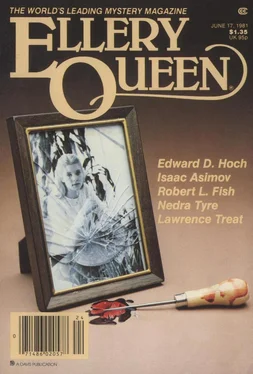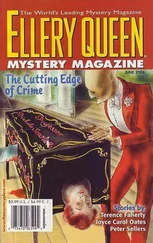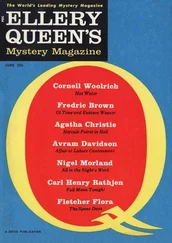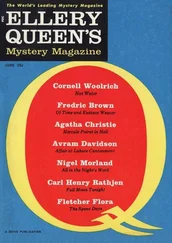Isaac Asimov - Ellery Queen’s Mystery Magazine. Vol. 77, No. 7. Whole No. 454, June 17, 1981
Здесь есть возможность читать онлайн «Isaac Asimov - Ellery Queen’s Mystery Magazine. Vol. 77, No. 7. Whole No. 454, June 17, 1981» весь текст электронной книги совершенно бесплатно (целиком полную версию без сокращений). В некоторых случаях можно слушать аудио, скачать через торрент в формате fb2 и присутствует краткое содержание. Город: New York, Год выпуска: 1981, ISBN: 1981, Издательство: Davis Publications, Жанр: Детектив, на английском языке. Описание произведения, (предисловие) а так же отзывы посетителей доступны на портале библиотеки ЛибКат.
- Название:Ellery Queen’s Mystery Magazine. Vol. 77, No. 7. Whole No. 454, June 17, 1981
- Автор:
- Издательство:Davis Publications
- Жанр:
- Год:1981
- Город:New York
- ISBN:ISSN: 0013-6328
- Рейтинг книги:5 / 5. Голосов: 1
-
Избранное:Добавить в избранное
- Отзывы:
-
Ваша оценка:
- 100
- 1
- 2
- 3
- 4
- 5
Ellery Queen’s Mystery Magazine. Vol. 77, No. 7. Whole No. 454, June 17, 1981: краткое содержание, описание и аннотация
Предлагаем к чтению аннотацию, описание, краткое содержание или предисловие (зависит от того, что написал сам автор книги «Ellery Queen’s Mystery Magazine. Vol. 77, No. 7. Whole No. 454, June 17, 1981»). Если вы не нашли необходимую информацию о книге — напишите в комментариях, мы постараемся отыскать её.
Ellery Queen’s Mystery Magazine. Vol. 77, No. 7. Whole No. 454, June 17, 1981 — читать онлайн бесплатно полную книгу (весь текст) целиком
Ниже представлен текст книги, разбитый по страницам. Система сохранения места последней прочитанной страницы, позволяет с удобством читать онлайн бесплатно книгу «Ellery Queen’s Mystery Magazine. Vol. 77, No. 7. Whole No. 454, June 17, 1981», без необходимости каждый раз заново искать на чём Вы остановились. Поставьте закладку, и сможете в любой момент перейти на страницу, на которой закончили чтение.
Интервал:
Закладка:
I was doing it again — thinking about her when I had decided to erase the ghost of Thalia from my life. That was, after all, what this trip was all about. I pulled up at a curb and rolled down the car window.
“ Por favor, senor... donde es el Hotel el Presidente?” The lounging figure of a young man straightened slightly. He looked curiously at my car and then at me.
“Dos cuadras ...” and he gestured ahead in the direction I was going.
“ Muchas gracias.”
I steered the car out into the honking traffic and a few minutes later pulled up in front of the former Convento de Santa Catalina, now another in the government’s line of Hotels “El Presidente.”
It was like walking into another century. Someone had been clever enough to preserve the cloistered atmosphere of the convent. The rooms faced a quadrangle, in the middle of which was a courtyard. A fountain in its center splashed soothingly over a shrouded figure kneeling reverently at its side. Old stone pots full of bright flowers lined the walls. Original wall paintings of saints, faded but still discernible, caught my eye as I looked for my room number, and I promised myself a closer look after I had settled in.
Opening the door to my room I half expected to find a barren cell with a straw pallet in the corner. Instead, I found bright orange woolen drapes and bedspreads, fuchsia and yellow flowers against swirled white plaster walls, and dark, almost black rough-hewn woodwork and furniture. Things obviously had changed since the time the nuns inhabited this convent! Then immediately came the thought that had I said that to Thalia she would have agreed, very seriously.
There was a large mirror, framed in hand-worked tin, shining over the desk. Looking in it from the doorway I saw two beds, and then it struck me: out of force of habit I had asked for a twin-bedded room. It was too late now, and too embarrassing, to go back and change. Besides, they were busy with a busload of tourists which was why I had found my own room and carried my own bag. It didn’t matter, this was probably a better, larger room, and I could afford it. But I kept looking at the empty bed, seeing Thalia’s white American Tourister suitcase on it, just as I had seen it so many times in the past.
I remembered when the department store delivered that suitcase, brand-new. It was so large! I had teased Thalia about it, calling it a second cousin to a steamer trunk and questioning her ability to lift the thing when it was packed. “The question is,” I had said, “can a ninety-nine-pound woman lift a one-hundred-pound suitcase!”
For Thalia had been tiny, and yet, ironically, she had had none of the qualities usually associated with diminutive women. Neither petite nor dainty nor perky, Thalia had just been tiny. Even her lovely name had been ironic. Thalia, the muse of comedy or merry poetry, had not smiled favorably on her namesake. A sickly child, an only child, Thalia had always depended on others to take care of her needs.
We both knew that lifting suitcases was my job, and I had seldom complained about the weight of her suitcase which always felt as though it were full of cement blocks. Over the years Thalia had remained the amateur traveler, packing heavy flatirons and hair dryers that, even with current converters, managed to blow fuses in hotels all over the world.
My own travel equipment has always been minimal — but I insist on the best quality in everything. My watch, for instance, must be water, shock, and magnetic resistant, and it must work with precision accuracy. The Gerard-Philippe I am wearing is a little masterpiece of mechanism. I bought it in Geneva two summers ago, and I’m sure Thalia had no idea how much I paid for it. It is a quartz digital, in silver, with an unusual orange face.
Ah, memories! Automatically I chose the bed I would have taken had Thalia been with me. She always chose the one nearer to the bathroom. It was a little joke with us, but not always funny. “The closer I am to the bathroom,” she used to say, “the better off I’ll be.” Poor Thalia! She was often plagued by car sickness, air sickness, and any other kind of motion sickness imaginable. After a day’s travel I usually had to eat dinner alone, always staying in the hotel to be near her, and to take hot soup or tea back to the room.
Even on our trip to Florida, over ten years ago now, to attend my mother’s funeral, Aunt Catherine had had to leave the service in the chapel to take care of Thalia. I had not been able to leave my mother’s side as she lay in her white-satin-lined coffin, looking lovely and gracious, just as she had in life. I had remained at her graveside for hours, until they had insisted I leave and go back to Aunt Catherine’s for some supper. Even there I found that Thalia was still resting and I had to eat alone. Tonight I would still have to eat alone — but not in the hotel. Tonight I would walk to the public square for Oaxacan food in a typical Mexican restaurant.
I chose one on the second floor, overlooking the square that was crowded with strollers, peddlers, and lovers who cuddled on the white-iron benches. Children played noisily around the fountain, chasing each other and getting wet from the spray when the wind blew. It was only seven, early for supper by Mexican standards. Most Mexicans were still digesting their four-o’clock small meal. Mexican restaurants, however, are not averse to serving dinner to foreigners at any hour, and my foreign stomach said it was dinnertime.
I chose the best table for two I could find, right next to the balcony railing. It occurred to me that there are never restaurant tables for one — always for a minimum of two. Maybe they were saying that no one should eat alone — everyone should have someone. This opened up a train of thought I was trying to avoid, so I concentrated on the menu.
Indulging my independent spirit — to say nothing of my strong stomach — I ordered the polio mole, chicken cooked in a sauce picante with a chocolate base. It was a strange combination I had always wanted to try. I had described it once to Thalia, but she had turned her head from the breakfast table. Just the contemplation of the ingredients in the national dish of Mexico had nauseated her.
The mole was delicious, almost black, and very thick. I could just barely taste the rich flavor of cocoa in its base. Combined with the exotic spices of the salsa, the chicken tasted like nothing else I had ever eaten. I was determined now to order the moles in other parts of Mexico, for comparison to the Oaxacan, reportedly the richest and darkest of the lot.
Ah, this was Mexico! Four more weeks ahead of me, a comfortable, air-conditioned car, a money belt full of travelers’ checks — the kind of vacation most people only dream of. If only Thalia could be here — but I must control those thoughts, even though they were natural for me.
Thalia’s reactions and opinions were part of me. Hadn’t I lived with her for fifteen years and traveled with her for five wonderful summers? Our life together had been what most people would call “normal.” I taught geography at the local junior college, and Thalia puttered around the house. I wasn’t fond of teaching, but as I jokingly said to colleagues, “It beats working!” At least I always had long summer vacation periods, and for five years now, Thalia’s mother’s money to spend on traveling.
What a time I had had getting Thalia interested in travel! When we were first married and her mother was still alive, they had both thought I was crazy to want to travel to foreign countries for a vacation.
For all their money, the farthest Thalia and her family had ever been from Akron, Ohio, was the Grand Canyon. Until her mother’s death, after which I worked hard to introduce her to the joys of travel, Thalia thought the Grand Canyon was the end of the earth.
Читать дальшеИнтервал:
Закладка:
Похожие книги на «Ellery Queen’s Mystery Magazine. Vol. 77, No. 7. Whole No. 454, June 17, 1981»
Представляем Вашему вниманию похожие книги на «Ellery Queen’s Mystery Magazine. Vol. 77, No. 7. Whole No. 454, June 17, 1981» списком для выбора. Мы отобрали схожую по названию и смыслу литературу в надежде предоставить читателям больше вариантов отыскать новые, интересные, ещё непрочитанные произведения.
Обсуждение, отзывы о книге «Ellery Queen’s Mystery Magazine. Vol. 77, No. 7. Whole No. 454, June 17, 1981» и просто собственные мнения читателей. Оставьте ваши комментарии, напишите, что Вы думаете о произведении, его смысле или главных героях. Укажите что конкретно понравилось, а что нет, и почему Вы так считаете.












